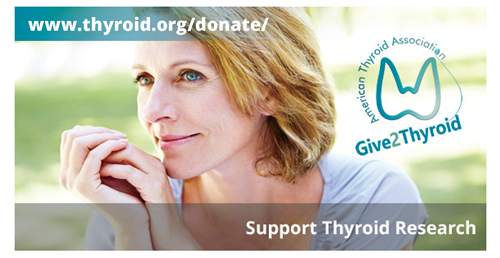Clinical Thyroidology for the Public summarizes selected research studies discussed in the previous month’s issue of Clinical Thyroidology, an official publication of the American Thyroid Association. Editor-in-chief, Alan Farwell, MD, FACE
Volume 11 Issue 4
Available in pdf format for saving and printing and Web page format for viewing online
PDF Format for Saving and Printing
Clinical Thyroidology for the Public Volume 11 Issue 4 (PDF file, 1.94 MB)
TABLE OF CONTENTS – Web Format
EDITORIAL What is the best treatment for hypothyroidism?
(PDF File for saving and printing, 605 KB)
HYPOTHYROIDISM A patient survey of hypothyroid individuals demonstrates dissatisfaction with treatment and their managing physicians
Hypothyroidism is a common endocrine problem that requires lifelong treatment with thyroid hormone. The fact that some L-T4-treated hypothyroid patients have symptoms despite normal blood levels of TSH has led to questions as to whether therapy with L-T4 alone is adequate for all patients. The Hypothyroidism Treatment Survey was created by the ATA to find out about the perceptions, other medical conditions, and treatment selections of patients with hypothyroidism who responded to the survey.
Peterson SJ, Cappola AR, Castro MR, Dayan CM, Farwell AP, Hennessey JV, Kopp PA, Ross DS, Samuels MH, Sawka AM, Taylor PN, Jonklaas J, Bianco AC. An online survey of hypothyroid patients demonstrates prominent dissatisfaction. Thyroid 2018 [Epub ahead of print]; DOI: 10.1089/ thy.2017.0681.
(PDF File for saving and printing, 745 KB)
THYROID AND THE HEART Thyroid hormone levels and risk of atrial fibrillation
Both overt and subclinical hyperthyroidism increases the risk of developing atrial fibrillation. Interestingly, some studies suggest that subclinical hypothyroidism may also increase the risk of developing atrial fibrillation. This study was done to determine whether thyroid tests within the normal range and subclinical hypothyroidism are associated with an increased the risk of developing atrial fibrillation.
Baumgartner C. et al. Thyroid Studies Collaboration. Thyroid function within the normal range, subclinical hypothyroidism and the risk of atrial fibrillation. Circulation 2017;Oct 23:pii: CIRCULATIONAHA.117.028753 [Epub ahead of print].
(PDF File for saving and printing, 599 KB)
THYROID AND PREGNANCY The effect of thyroid hormone replacement therapy on risk of preterm delivery in pregnant women with subclinical hypothyroidism and negative thyroid peroxidase antibodies.
At present, expert endocrinologists have not yet reached agreement regarding the treatment of women with subclinical hypothyroidism during pregnancy. To try to study the effect of an increased TSH alone on pregnancy outcomes, this study sought to determine whether thyroid hormone replacement therapy would be beneficial for reducing preterm delivery in pregnant women with subclinical hypothyroidism and negative TPO antibodies.
Nazarpour S, et al. Effects of levothyroxine on pregnant women with subclinical hypothyroidism, negative for thyroid peroxidase antibodies. J. Clin Endocrinol. Metab. 2018. 103 (3): 926-935.
(PDF File for saving and printing, 733 KB)
HYPOTHYROIDISM Probiotic substances do not impair oral levothyroxine intestinal absorption
Many medications, foods and supplements can affect the absorption of levothyroxine from the intestine. If these items are taken at the same time it can lead to frequent changes in the levothyroxine dose. Probiotics are digestive supplements whose use has markedly increased in recent years. This study is done to assess whether probiotics may affect absorption of levothyroxine.
Spaggiari G, et al. Probiotics ingestion does not directly affect thyroid hormonal parameters in hypothyroid patients on levothyroxine treatment. Front Endocrinol 8:316. 2017 PMID: 29184537.
(PDF File for saving and printing, 646 KB)
HYPERTHYROIDISM Surgery for hyperthyroidism lowers cardiovascular mortality compared with radioactive iodine
Three main treatment options are currently available for hyperthyroidism, each of them having specific benefits and side effects. To date, only a few studies have evaluated the long-term adverse effects from these treatments. The aim of this study was to compare the long-term death rate of hyperthyroid patients treated with radioactive iodine therapy with those treated with surgery.
Giesecke P et al. 2017 All-cause and cardiovascular mortality risk after surgery versus radioiodine treatment for hyperthyroidism. Br J Surg. Epub 2017 Nov 8. PMID: 29116656.
(PDF File for saving and printing, 605 KB)





